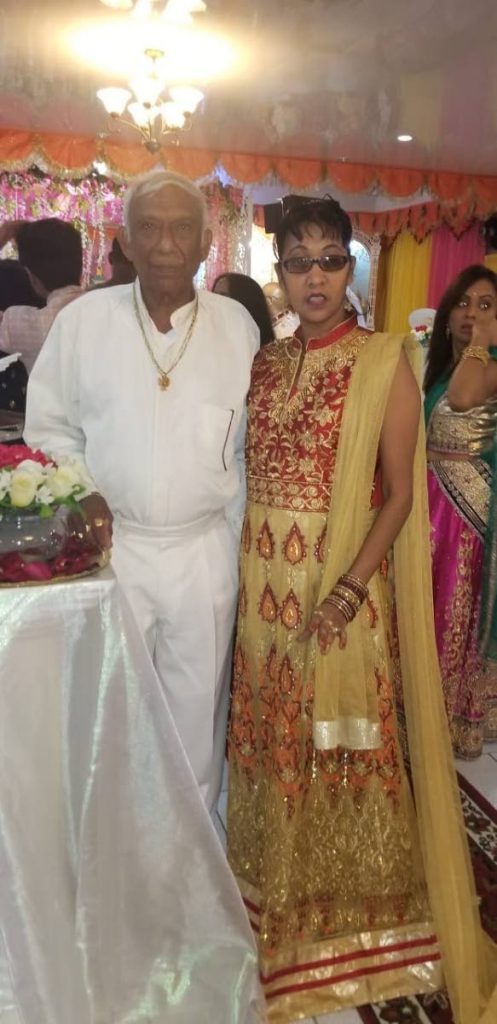Woman to appeal to cremate father on open-air pyre

UNABLE to fulfil her father’s dying wish for a Hindu open-pyre cremation, the daughter of a covid19 patient intends to approach the Court of Appeal.
Attorneys for Cindy-Ann Ramsaroop-Persad will appeal a judge’s refusal to grant her an interim order so that she can cremate her father at the Waterloo cremation site.
They will also seek to challenge the prolonged case-management timetable set by Justice Avason Quinlan-Williams at a virtual hearing of the case on Thursday.
Giving directions for the filing of submissions and legal authorities, the judge set November for the hearing of the trial.
Earlier this week, Quinlan-Williams granted Ramsaroop-Persad permission to challenge the ban on open-air pyre cremations.
Ramsaroop-Persad’s father, Silochan, 77, died at the Couva Hospital and Multi Training Facility on July 25.
His death certificate said he died of covid19 pneumonia, covid19 infection, hypertension and Type II diabetes.
The police initially gave the family a permit for his final rites at the Waterloo Cremation Site, but this was later rescinded. The family was told it had to be revoked because of the ban on open-air pyre cremations for covid19 deaths. Open-air pyre cremations are allowed for those who did not die of covid19.
The judge did not grant Ramsaroop-Persad’s application for interim relief – to direct the commissioner of police to issue a cremation permit in 24 hours so the family can have an open-air pyre cremation, So Ramsaroop’s funeral is on hold. His body is at the Dass Funeral Home, where his daughter works.
In support of her lawsuit, Ramsaroop-Persad said her father, a religious man, wanted to be cremated at the Waterloo site and his dying wish was that for the rituals for Hindu cremations to be done when he died. She said she assured him she would see his wish was honoured.
Ramsaroop’s widow, Tara, said her husband had set aside $10,000 for his cremation, as he did not want to be a burden to their six children, nor did he want them to throw it in his wife’s face that they had to help her.
She said she cannot afford the $20,000 needed for a cremation, and grieved for other Hindu families who are being denied the right to perform the rituals for their loved ones who may have died from covid19.
She also said it would be unfair to pick which of their children would be allowed at the cremation, and, as a Hindu, she was taught that a soul cannot leave the body unless it is cremated outside.
She said she was deeply troubled, as the thought of having her husband’s body remain in a cold dark room for weeks, while waiting for an expensive indoor cremation she and her children cannot afford, was too much to endure.
In the lawsuit, Ramsroop-Persad is claiming there appeared to be a blanket prohibition against open-air pyre funerals.
“The unfair and discriminatory effect of this ban is obvious as Hindus cannot cremate their dead in accordance with their religious belief and practice,” the lawsuit said.
She is also alleging that her constitutional rights are being breached by the prohibition, which she also alleges is arbitrary, irrational and unfair.
Her lawsuit says the measure disproportionately affects the Indian and Hindu community.
Ramsaroop-Persad is represented by attorneys Anand Ramlogan, SC, Jayanti Lutchmedial, Vishaal Siewsaran, Renuka Rambhajan, Natasha Bisram and Cheyenne Lugo.
The State is represented by Senior Counsel Fyard Hosein and Rishi Dass.
Ramsaroop-Persad’s claim includes an expert opinion by Dr Farley Cleghorn, a Trinidadian epidemiologist based in Washington, DC, who has provided similar opinions on various infectious diseases, including covid19, on several American television networks.
Cleghorn said after a year and a half of the pandemic, he believes the risks from handling the bodies of covid19 cases after death “are vanishingly low.”
He said elsewhere in the world, including India, open-pyre cremations were not banned.
He also said the only means of post-mortem infection was through contact with the bodily fluids of a fresh body.
Cleghorn said there were international guidelines on open-air cremations, and no data to suggest a risk of the virus being transmitted by smoke or ashes.
"This is more of a stigma than a scientific fact.”
In fact, he said, open-air cremations “may actually be less risky” than indoor cremations.


Comments
"Woman to appeal to cremate father on open-air pyre"